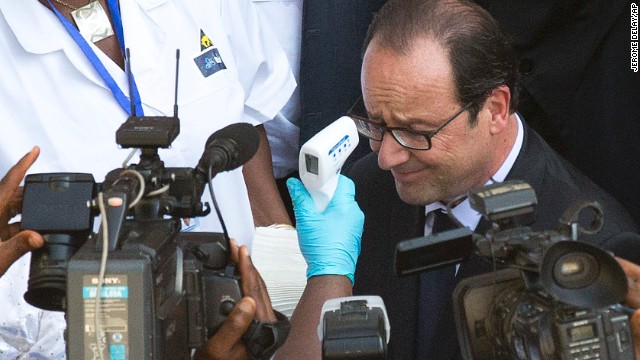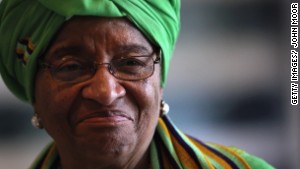 French President Francois Hollande
has his temperature taken as he arrives at the Donka hospital in
Conakry, Guinea, on Friday, November 28. Health officials say the Ebola
outbreak in West Africa is the deadliest ever. More than 5,600 people
have died there, according to the World Health Organization.
French President Francois Hollande
has his temperature taken as he arrives at the Donka hospital in
Conakry, Guinea, on Friday, November 28. Health officials say the Ebola
outbreak in West Africa is the deadliest ever. More than 5,600 people
have died there, according to the World Health Organization.
The Ebola epidemic
Irwin Redlener is director of the National Center for Disaster Preparedness at Columbia University's Earth Institute
and the author of "Americans at Risk: Why We Are Not Prepared for
Megadisasters and What We Can Do Now." The views expressed are his own.
(CNN) -- Ebola may have faded from the headlines in
the United States, but the threat -- to Africa and the rest of the world
-- remains.

 Liberian President video diary
Liberian President video diary
 Ebola co-discoverer on how vaccine works
Ebola co-discoverer on how vaccine works
This month, the Senate
Homeland Security Committee held a hearing on Ebola, including testimony
by Dr. Tom Frieden, director of the Centers for Disease Control and
Prevention. He noted that the CDC had lowered its estimate of the number
of cases likely to emerge in West Africa. Despite this positive news,
Ebola remains largely out of control in Sierra Leone.

Irwin Redlener
The World Health
Organization announced this month that Guinea is "relatively stable,"
but the recent spread of the virus into Mali only confirms the need for a
greater sustained effort to combat Ebola at its origin.
That's why many experts
are cautioning that declaring the emergency over is premature. And it's
why the Obama administration and key members of Congress are requesting
$6.1 billion to beef up our ability to eradicate Ebola and prepare for
future epidemics.
There are two reasons why this emergency is far from over.
First, as long as Ebola
rages in West Africa, health care systems in the United States and
elsewhere will need to remain on high alert. There is no way to assure
that Ebola -- or other known and unknown biological threats -- will be
contained without the ability on a global scale to identify, manage,
eradicate or even prevent these diseases from spreading.
 Liberian President video diary
Liberian President video diary
 Ebola co-discoverer on how vaccine works
Ebola co-discoverer on how vaccine works
Improving our capacity to
develop vaccines, respond to crises overseas and develop other
countermeasures for dangerous viruses are vital.
Second, the death from
Ebola of Thomas Eric Duncan in Dallas was a powerful illustration of how
unprepared we are to deal with large-scale biological threats. Few of
the almost 5,000 hospitals in the United States are at the level of
Bellevue Hospital Center in New York, Emory University Hospital in
Atlanta, the University of Nebraska Medical Center or the handful of
other facilities that have been designated as ready to handle Ebola-like
illnesses.
Why aren't we ready? Part
of the problem is that budget cuts over the last decade have slashed
the federally funded Hospital Preparedness Program and special disaster
funding for public health agencies. Indeed, since 2008, some 50,000
public health positions have been eliminated due to funding cuts.
For many public health
agencies, even getting routine work done, never mind responding to
crises, is proving a challenge for many communities in the United
States.
The emergency funds being sought to respond to Ebola here and in Africa are critical to helping protect the American public.
The recent U.S.
experience of Ebola was a wake-up call. But if the country hits the
snooze button once the media coverage fades, we'll have missed a
critical moment to deal not just with this deadly illness, but with
future disasters, too.
No comments:
Post a Comment